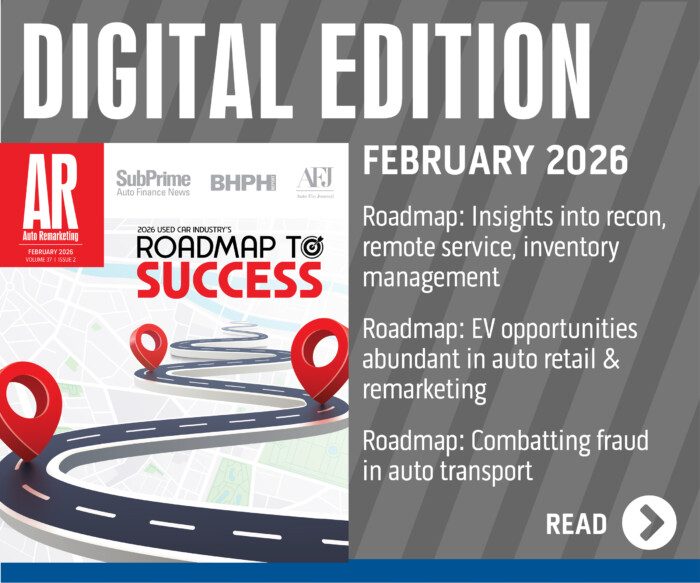3 suggestions for spotting & preventing fraud

Image by garagestock/Shutterstock.com
By subscribing, you agree to receive communications from Auto Remarketing and our partners in accordance with our Privacy Policy. We may share your information with select partners and sponsors who may contact you about their products and services. You may unsubscribe at any time.
ATLANTA –
Equifax auto finance leader Lou Loquasto insisted every credit provider and buyer of vehicle installment contracts has a story about how deliveries might have been completed because of some kind of fraud. Loquasto pointed out that sometimes it’s a “rogue” F&I manager or another unscrupulous member of a dealership’s staff.
“I’ve got my story. My guy is in jail currently,” said Loquasto, who spent a major portion of his professional career at Wells Fargo.
While malfeasance at the dealership level might not be as prevalent, consumers trying to deceive their way to approvals certainly is a growing problem. Loquasto shared, “You could Google the term ‘fake pay stubs’ and you get 370,000 results. For $5 and you invest five minutes, you can make $800,000 a year on paper. Some of these fakes are really good.”
In fact, PointPredictive, a provider of fraud solutions to banks and finance companies, generated a white paper at the beginning of the year detailing new analysis confirming that auto financing fraud risk has been rising for several years, but remains hidden in credit losses. PointPredictive estimates the annual value of auto finance originations that contain some element of misrepresentation may be as high as $6 billion in 2017, which is twice as much as 2016 estimates.
“I think the biggest problem when I was a lender and now talking to people in the business is there’s never been a good way to understand which portion of your loss comes from fraud,” Loquasto said. “You may forecast a 2 percent loss on your portfolio, but you’re not sure exactly what portion of that might have come from fraud.
“You know when that one situation comes up that it’s verified fraud, everyone gets really angry,” he continued. “The thing about fraud is a lot of times you just lose the whole deal. It’s not like a regular repossession where a customer goes bad and you lose half of it. In these situations, you’re losing the whole loan.”
Subscribe to Auto Remarketing to stay informed and stay ahead.
By subscribing, you agree to receive communications from Auto Remarketing and our partners in accordance with our Privacy Policy. We may share your information with select partners and sponsors who may contact you about their products and services. You may unsubscribe at any time.
The issue of fraud arrived again this week. Santander Consumer USA announced that it reached settlements totaling $25.9 million with the attorneys general of Delaware and Massachusetts in part because law enforcement said that SCUSA allegedly knew that the reported incomes, which were used to support the applications submitted to the company by dealers, were incorrect and often inflated.
Officials went on to state the investigation by Delaware and Massachusetts also revealed that SCUSA was allegedly aware that certain dealerships had high default rates due in part to the regular submission of inaccurate data on financing applications — most often involving inflated income. A company spokesperson said Santander neither admitted nor denied the allegations made by the attorneys general about contracts facilitated through certain dealers between 2009 and 2014.
Before this SCUSA settlement became public, Loquasto described what sometimes happens when a finance company learns that a dealership in its origination network fudges the numbers, so to speak, in order for the contract to be purchased and delivery completed.
“As a lender, this is crushing to your relationship with the dealer,” Loquasto said. “You’ve got a dealer you’re working with for a long time and maybe they’ve got a rogue employee. Maybe it’s just rogue people going to the dealership. If you’re asking the dealer to buy back $50,000 in losses from you or if you found out they had an employee that is doing bad things, that’s really bad for the relationship with the dealer.
“As a lender, it’s something on the radar, but I just don’t think there has ever been a real good mechanism to figure out that fraud has occurred and figure out how to share that information with others in the industry so lenders can help each other,” he continued.
In an effort to enhance possible collaboration, Equifax shared a trio of suggestions that could help finance company’s fraud prevention efforts. The recommendations included:
—A shared environment: Rather than relying on their own data, finance companies should be leveraging intelligence from data consortiums that span multiple businesses across multiple industries to stay ahead of the curve.
—Customizable platforms: Systems such as Equifax’s FraudIQ Manager can leverage customizable rules and models, providing lenders the ability to adapt to their unique needs, industry changes or new types of fraud.
—Real-time Intelligence: Fraudsters work fast, so finance companies need to act faster. The best fraud review processes can provide finance companies real-time intelligence for more efficient and confident identification of potential fraud.
Mike Urban, who is vice president of fraud consulting at Equifax, described how these recommendations are even more crucial in light of how online paths to auto financing are become more widespread.
“By moving to more digital access to funds and applications, it’s easier to take that paystub I downloaded off of the Internet, take a picture of it, copy it or scan it, and all of that information is going into the approval process so these criminals can launch broader attacks to see which one is going to come back with an approval. Then once they get that approval, they can walk into the dealer say ‘I’m preapproved. I’ve got my ID, and I’m driving off with the car,’” Urban said.
“Criminals will routinely take advantage of a lenders’ lack of sharing of information to execute large frauds. The more intelligence, the more experience that one lender has with verifying identity, that can be shared so when it hits again they’ll know right away and be able to sidetrack that application and manage it without allowing the credit to go out. Criminals have been sharing data over the Internet for years, and legally, the good guys should be doing it as well,” he continued.
Both Loquasto and Urban mentioned that Equifax has been part of consortiums in both the United Kingdom and Canada for quite some time to combat fraud, and the company recently launched a similar effort in the United States.
“If you think about it, a fraudster or some consumer will fraud on a cell phone and then maybe on a pay TV account. And then maybe they’ll fraud a credit card. These aren’t guys who do it once and are done,” Loquasto said.
“If you can bring in other companies from other verticals to share fraud experience, that’s where our consortiums have found a lot of value,” he continued.
And possibly through that sharing of ideas and information, Urban contends that auto finance companies could arrive at a place where fraud can be mitigated perhaps more than it is now.
“Every lender has different needs and they require solutions that are customized or configured to meet their needs and dynamic business requirements,” Urban said.
“It’s not enough to say I’ve got this big data. They really need a system to implement fraud strategies, looking at different data elements that are coming in through applications, tying together additional data elements into those decisions using analytic models so they can score what their risk is,” he went on to say.
Loquasto closed by saying he has a long-term goal of leading an industry-wide charge of reducing fraud by at least $1 billion.
“Lenders are spending a ton of money on data, credit data, income and employment data, alternative data, but they’re just not spending very much money on fraud. I think people are becoming awakened to the problem and the tools,” Loquasto said.
“We’re a very collaborate industry,” he continued. “You go to conferences and our industry is one of the most collaborative out there. We’re perfect for this type of solution. I think if we work together as lenders and vendors, we can really cut deep into the profits of these fraudsters.”


